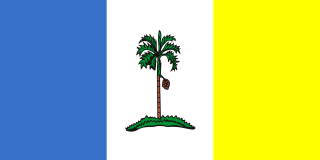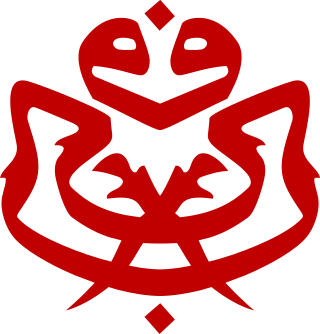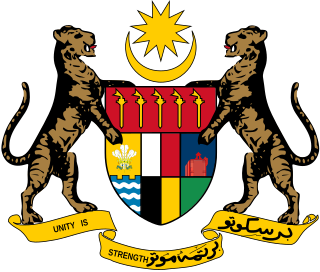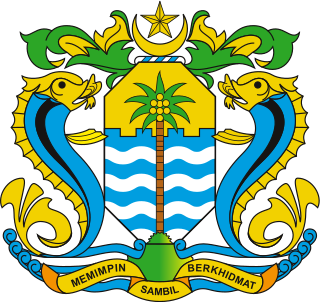
Penang is a Malaysian state located on the northwest coast of Peninsular Malaysia, by the Malacca Strait. It has two parts: Penang Island, where the capital city, George Town, is located, and Seberang Perai on the Malay Peninsula. The two halves are connected by the Penang Bridge and the Second Penang Bridge; the latter is also the second longest sea crossing in Southeast Asia. The second smallest Malaysian state by land mass, Penang is bordered by Kedah to the north and the east, and Perak to the south.

The Federation of Malaya was a federation of what previously had been British Malaya, comprising eleven states that existed from 1 February 1948 until 16 September 1963. The Federation became independent on 31 August 1957, and in 1963, Malaysia was formed when Malaya united with Singapore, North Borneo, and Sarawak.

The United Malays National Organisation ; abbreviated UMNO or less commonly PEKEMBAR, is a nationalist right-wing political party in Malaysia. As the oldest continuous national political party within Malaysia, UMNO has been known as Malaysia's "Grand Old Party".

The Malaysian People's Party is a political party in Malaysia. Founded on 11 November 1955 as Partai Ra'ayat, it is one of the older political parties in Malaysia and traces its pedigree to the anti-colonial movements from the pre World War II period like the Kesatuan Melayu Muda.

Malaysian Chinese, alternatively Chinese Malaysians, are Malaysian citizens of Han Chinese ethnicity. They form the second-largest ethnic group, after the Malay majority, and are 22.8% of the Malaysian population. Most of them are descendants of Southern Chinese immigrants who arrived in Malaysia between the early 19th and the mid-20th centuries. Malaysian Chinese form the second largest community of Overseas Chinese in the world, after Thai Chinese. Malaysian Chinese are traditionally dominant in the business sector of the Malaysian economy.

PAP–UMNO relations refers to the occasionally-turbulent relationship between the People's Action Party (PAP), the governing party of Singapore since 1959, and the United Malays National Organisation (UMNO), the leading party of the Barisan Nasional coalition which governed Malaysia from 1955 to 2018. The two parties' relationship has impacted Malaysia–Singapore relations given the countries' geographical proximity and close historical ties.

Malaysian nationality law details the conditions by which a person is a national of Malaysia. The primary law governing nationality requirements is the Constitution of Malaysia, which came into force on 27 August 1957.

Malay nationalism refers to the nationalism that focused overwhelmingly on the Malay anticolonial struggle, motivated by the nationalist ideal of creating a Bangsa Melayu. Its central objectives were the advancement and protection of Malayness: religion (Islam), language (Malay), and royalty. Such pre-occupation is a direct response to the European colonial presence and the influx of a foreign migrant population in Malaya since the mid-nineteenth century.

The State of Penang, one of the most developed and urbanised Malaysian states, is located at the nation's northwest coast along the Malacca Strait. Unlike most Malaysian states, the history of modern Penang was shaped by British colonialism, beginning with the acquisition of Penang Island from the Sultanate of Kedah by the British East India Company in 1786. Developed into a free port, the city state was subsequently governed as part of the Straits Settlements, together with Singapore and Malacca; the state capital, George Town, briefly became the capital of this political entity between 1826 and 1832. By the end of the 19th century, George Town prospered and became one of the major entrepôts in Southeast Asia.
The All-Malaya Council of Joint Action (AMCJA) was a coalition of political and civic organisations in Malaya formed to participate in the development of a constitution for post-war Malaya in preparation for independence and to oppose the Constitutional Proposals for Malaya which eventually formed the basis of the Federation of Malaya Agreement.

The British Military Administration (BMA) was the interim administrator of British Malaya from August 1945, the end of World War II, to the establishment of the Malayan Union in April 1946. The BMA was under the direct command of the Supreme Allied Commander South East Asia, Lord Louis Mountbatten. The administration had the dual function of maintaining basic subsistence during the period of reoccupation, and also of imposing the state structure upon which post-war imperial power would rest.

The Penang Island City Council (MBPP) is the local government that administers the city of George Town, which includes the entirety of Penang Island. The city council, which has jurisdiction over an area of 306 km2 (118 sq mi), falls under the purview of the Penang state government.

The Royal Malaysia Police trace their existence to the Malacca Sultanate in the 1400s and developed through administration by the Portuguese, the Dutch, modernization by the British beginning in the early 1800s, and the era of Malaysian independence.

The Alliance Party was a political coalition in Malaysia. The Alliance Party, whose membership comprised United Malays National Organisation (UMNO), Malaysian Chinese Association (MCA) and Malaysian Indian Congress (MIC), was formally registered as a political organisation on 30 October 1957. It was the ruling coalition of Malaya from 1957 to 1963, and Malaysia from 1963 to 1973. The coalition became the Barisan Nasional in 1973.

The Asian Socialist Conference (ASC) was an organisation of socialist political parties in Asia that existed between 1953 and 1965. It was established in an effort to build a Pan-Asian multinational socialist organization, clearly independent from earlier European colonial centers, yet free from the new superpowers of the Cold War. Until 1963 its headquarters was in Rangoon, Burma; the first chairman and treasurer of the conference were the Burmese socialist leaders Ba Swe and Kyaw Nyein respectively. As of 1956, the member parties of ASC had a combined membership of about 500,000. In total, four Asian Socialist Conferences convened: Rangoon, 1953 and 1954, and Bombay, 1956 and 1965.
The Selangor Labour Party was a political party in Selangor, Malaya. The party was founded on 22 December 1951. As of 1953, K.C. Chia was the chairman of the party, A. Tharmalingam the secretary and M. Arokiasamy the vice chairman. The party was represented in the Federal Legislative Council by Wong Pak Choy.

Heah Joo Seang was a Malayan politician, business leader, rubber magnate, philanthropist and especially a supporter of education. Malaysia, as it has since become, only existed after Joo Seang's death. His contributions span three distinct periods in the country's history: the British Malaya period, the Malayan Union period, and the Federation of Malaya period.

The Malayan Peoples' Socialist Front or better known as Socialist Front (SF) or Barisan Sosialis (BS) was a left-wing coalition of Malaysian socialist parties. It was among the longest-standing opposition coalitions in Malaysian general election history. The coalition was formed by Parti Rakyat Malaya (PRM) and the Labour Party of Malaya on Hari Merdeka in 1957. In 1964, the National Convention Party (NCP) joined the coalition. PRM left the coalition in 1965 and NCP soon become inactive. The Labour Party, the only remaining party in SF, abandoned it on 10 January 1966 and reverted to its own banner.

Penangite Indians, also known as Chulias, are Malaysian Indians that live primarily in the state of Penang, Malaysia. Most are the descendants from those who migrated from India during the British colonisation of Malaya. However, historical sources prove that the ancient Indians arrived in Penang during the Chola dynasty. Penangite Indians forms a large percentage of the state's professional community such as business, law and medicine as well as politics, it can be proven by the appointment of Dr. P. Ramasamy as deputy chief minister of Penang. It made him the first Malaysian of Indian origin to hold the post of deputy chief minister in any state of Malaysia. In addition, first Tamil Vernacular School in Malaysia was established in Penang.

















